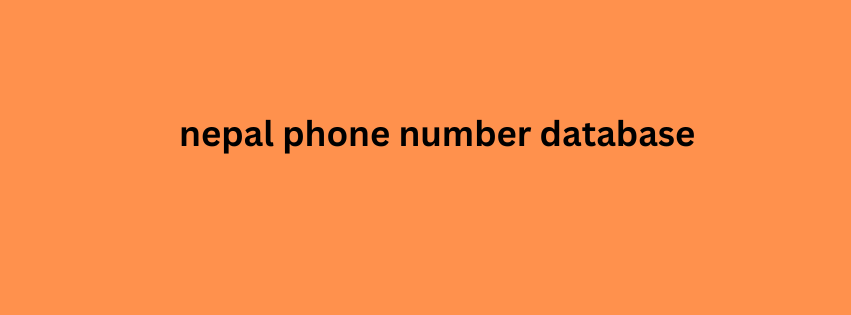There’s a popular saying: “More leads, more sales.” This isn’t just a cliché, it’s the real truth.Think of lead generation as the intermediary between your company and potential customers.
A lead generation strategy is more than just getting names on a list. It’s about turning those prospects into loyal customers who can’t get enough of your products.
In this article, we’ll explore 6 proven methods for generating high-quality B2C leads that drive conversions. These strategies range from optimizing landing pages to leveraging social media to attract and capture leads that are more likely to convert into customers. Read on to learn simple yet effective ways to increase your conversion rates and lead generation results.
What does B2C lead generation mean?
B2C lead generation (business to customer) refers to the process of attracting and capturing potential customers (leads) who are consumers rather nepal phone number database than businesses. This involves B2C businesses selling their products or services to potential customers.
B2C Lead Generation Types
The main types of B2C markets include inbound andOutbound Lead Generation.
Inbound B2C Lead Generation
Inbound lead generation may involve attracting potential customers through marketing efforts such as content marketing, SEO, social media, blogging, etc., which are designed to provide consumers with informational content to cultivate them into leads.
Outbound B2C Lead Generation
Outbound lead generation includes advertising, telemarketing, direct mail, orEmail MarketingAn outward-looking strategy can also lead to new business opportunities if it is clearly targeted and personalized.
For example, email marketing has proven to be one of the best channels for generating conversions.B2.8C brand is 2%B2.4B is 2%.
B2C Lead Generation Email Marketing Facts
Image created by the author –Data Source
5 B2C Lead Generation Techniques to Drive Conversions
Here are some lead generation techniques for B2B businesses that will drive conversions and help youThrive in the Future of E-Commerce:
Social Media Contest
Social media contests are a very effective way for B2C companies to attract potential customers by incentivizing participation. These contests entice users to provide their contact information through social media platforms in exchange for a chance to win a prize.
Get leads through contest entry forms
The key is to ask contestants to fill out the submission form.Contact FormCollect lead data such as email, name, demographics, interests, etc. By making form completion mandatory, you can grow your lead list and nurture those contacts over time.
Tips for hosting a successful contest
Choose the right social media platform where your audience is most active.
Set clear contest goals, rules, and guidelines.
Offer prizes that are particularly appealing to your target audience.
Create valuable content and eye-catching visuals to promote your contest.
Promote your social media marketing strategy extensively through organic and paid methods.
Simplify input forms to maximize conversions.
Encourage social sharing and engagement.
Follow up with contestants after the competition.
Creative Competition Concept
Photography Contest – User submitted images related to your brand/theme
Caption Contest – User-submitted captions for your images
Trivia Contest – Users answer questions about your product/industry
Sweepstakes – Simple prize giveaways that require minimal effort.
Content Offer/Lead Magnet
Content offers, also known as lead gen, are irresistible content that businesses offer to audiences in exchange for their contact information, such as an email address. They work by providing value up front, enticing prospects to take action and engage with your brand. This has led to more than60%Marketers use lead magnets in their marketing campaigns.
B2C Lead Generation fact
For example, an online clothing retailer might offer a free style guide or downloadable wardrobe checklist in exchange for a visitor’s email address. These offers are a way to build a relationship with potential customers and nurture them through the sales funnel.
Examples of effective user engagement
E-books or white papers that address common pain points or provide valuable insights
Templates or toolkits that help solve specific problems or simplify processes
Guides or tutorials that provide step-by-step instructions or expert advice
Webinars or online seminars that provide in-depth education or training on relevant topics
Free trials or samples allow potential customers to experience your product or service firsthand
The most effective types.


